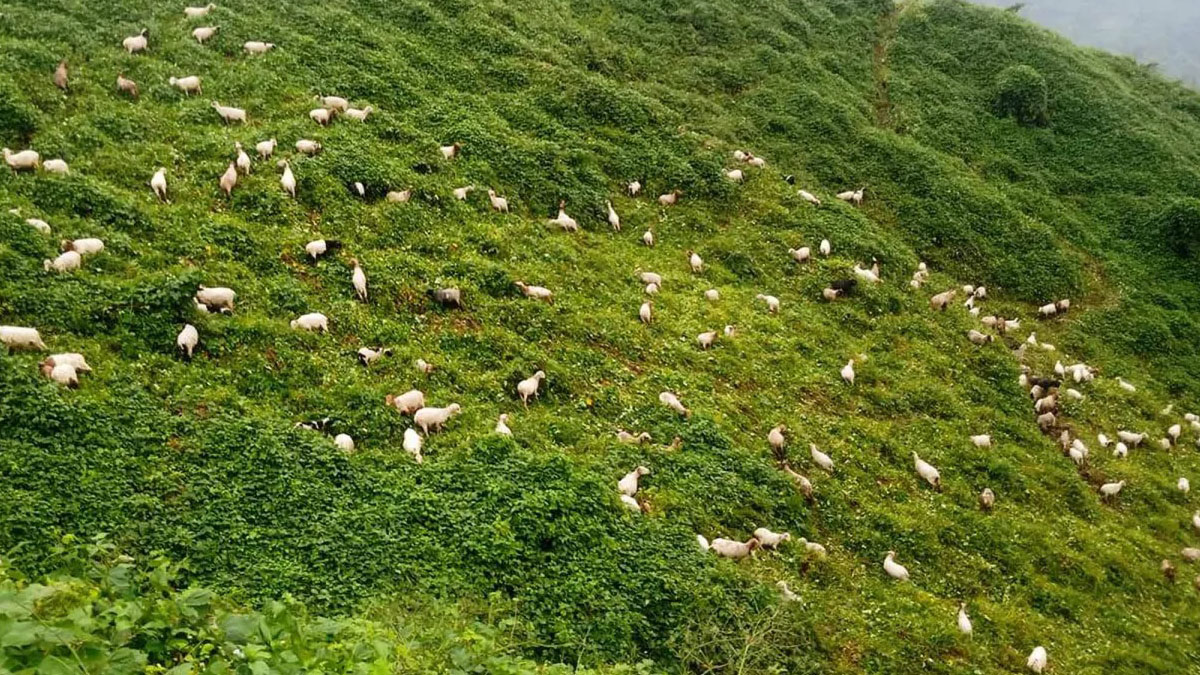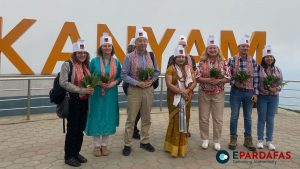
Sheep farming facing threat as new generation not showing interest

It is time for herders of Dhorpatan to ascend to the highlands along with their flocks of sheep.
People with poles and ropes over their shoulder for tying their sheep are found at Soledanda, Deurali, Baglung and around the border of East Rukum. Small huts made from tarpaulin for sheep are found scattered.
Far away from hustle and bustle of city life, it seems the shepherds are untouched and unaware about facilities that are otherwise available in city areas. They seem to be invested their own way in rural settings with clean environment, and busy with their age-old occupation of raising sheep. Generally, shepherds drive their sheep to highlands from mid-May to mid-September when summer begins, and descend to lowlands when winter begins.
Sat Bahadur Gurung of East Rukum, who took flocks of his sheep to Patihalne, the confluence of Baglung, Rolpa and Rukum one month ago, is planning to shift the herd to highland, Buki after June 30. He, 62, has taken up his ancestral occupation of raising sheep for the past 47 years, as he has no other option. Being deprived of education, he wishes to keep his ancestral profession intact. “For me, there is no other alternative to agriculture and livestock farming,”
He however expressed his concern about the sheep farming facing a threat as the new generations are according to him uninterested. “Vehicles reach villages. People get education. People have quit livestock farming. They prefer to earn, eat and live in city areas. We did not have such facilities during our time,” he said.
Today’s generation of children want to keep up with modern time. They are uninterested in cattle farming, he said. “Being deprived of education, we have taken up the profession of raising sheep. This hardship continues befalling me even during my old age.”
He has now around 500 sheep, of which 19 are pregnant. His 43 sheep died due to rain last month. He has brought with him money that would cover his expenses only for two months. He is planning to descent to the lowland next month to take money after assigning others to take care of his sheep. Although the profession involves hardship, he is satisfied, he said.
Birbal Ghartimagar of Nisikhola Rural Municipality-6 has constructed a shed for sheep just a few distances away from Patihalne, around 3,200 metres above sea level. He has kept sheep in black, white and brown in colour. He has constructed a hut at Rig for himself.
There is no difficult in transporting goods for him in the grazing field as the national pride Mid-Hill Highway runs just below his shed. Having started since childhood, Ghartimagar, 53, still has courage and enthusiasm at sheep farming. He is not in the mood to quit the profession anytime soon. “I will continue with this job until my body allows.” He grazes sheep at Rig, Patihalne, and Tilachan area on the border of Rolpa and Rukum districts.
Ghartimagar’s four generations engaged in livestock farming. He quit school while he was studying grades three, and took up the job of raising sheep, he said. He has also kept three dogs as security guards for the sheep and himself. These dogs are enough to save sheep from robbery and wildlife, he said.
He was abducted in 2052 BS during the Maoist insurgency when he was grazing sheep. After being released, he continued this profession. “We would take sheep to forests to graze while others pursued education. I started grazing sheep since childhood. My brother asked me to go with him to earn money far away from home. We went to Batauli and worked there. After 13 months, I returned home, rejoined school and completed grades three. After quitting school, I again became a shepherd. I also got married.”
Ghartimagar quit raising sheep for some times at a time when all his sheep numbered scores died from diseases. However, he again took up this job.
He however is concerned about the new generation not being interested in conserving this profession.
Development activities have had its impact on many traditional things including sheep farming, according to him. Traditional professions are gradually disappearing with youths going to foreign countries for a job and migrating to city areas, he said.
Ran Bahadur Sirpali of Tamankhola Rural Municipality-5 in Baglung district has turned 71. But, he is still full of energy. His regular duty of herding sheep begins from morning until going to bed. He has raised 250 sheep. Sirpali is preparing to ascend to the highland in Buki to graze sheep along with his brother Dev Bahadur. Dev Bahadur has raised 150 sheep. Ran Bahadur began the job of raising livestock when he was seven years old. Most of the villagers here depend on livestock farming for livelihood.
Being wary of sheep farming facing the risk of disappearance due to the new generation not showing interest, Ran Bahadur calls for conserving this age-old profession. With time, many things have changed. “In the past, a single person would raise 2,000-3,000 sheep. Now, only a few has raised sheep. We were born and brought up in a sheep shed. I started herding sheep when I remembered. We did not have any other occupation to pursue. We were born in the poor family. This profession involves hardship. Cities are foreign for us. We are fond of spending time in sheep sheds even when it involves hardship,” he shared.
Without conservation and interest of new generations, sheep farming has been at risk with decreasing number of shepherds over years, he said.
- Minister Gurung Hails Ghalegaun’s Role in Promoting Homestay Tourism Across Nepal
- India Accelerates Arms Procurement Amid Push for Military Modernization
- Development Spending Reaches Just 29% in Third Quarter of FY 2024/25
- Former King Gyanendra Extends New Year Wishes, Expresses Concern Over Recent Violence












Comments